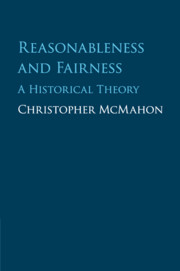3 - Political Morality
from Part I - The Substance of Reciprocal Concern
Published online by Cambridge University Press: 24 November 2016
Summary
The previous two chapters have explored the place of reasonableness and fairness in mutually beneficial cooperative endeavors, generally understood. In this chapter I consider the possibility of extending the understanding of the morality of reciprocal concern developed in those chapters to the case of political cooperation in a modern liberal democracy. This brings us to the domain of political morality. Political morality addresses how political cooperation morally ought to be organized. It seeks to answer questions of two different kinds. The first concerns the cooperative scheme – the specification of what each is to do and what each will get if everybody does what he or she is supposed to do – that morally ought to be put into place. It will not usually be possible to secure agreement about this. The second question concerns how, in the normal case where there is disagreement about the appropriate cooperative scheme, the decision among the different candidate schemes morally ought to be made.
A realist view of political morality could posit the existence of timeless and universal moral principles providing answers to these questions. In the course of human history, populations have instituted different forms of political cooperation. The timeless principles would provide a basis for comparing the moral acceptability of these different efforts and for making a judgment about whether there has been moral progress.
On the constructivist approach that I propose, by contrast, political morality is understood as evolving through a process in which conceptual and social change reciprocally condition one another. I term this “the conceptual-cum-social process.” It is described in more detail in Chapter 5. Changes in the social and natural environment make some members of a polity “uncomfortable,” in the sense that they experience the way political cooperation is organized as incompatible, in certain respects, with the proper functioning of the mental capacities exercised in political cooperation. They react by modifying the concepts that identify reasons relevant to the organization of political cooperation. And by acting on the resulting judgments, they confront other members of the community with social changes that may prompt a response of a similar kind from them. Thinking about how political cooperation morally ought to be organized thus evolves piecemeal in a way that is not guided by any response-independent moral standard.
- Type
- Chapter
- Information
- Reasonableness and FairnessA Historical Theory, pp. 101 - 132Publisher: Cambridge University PressPrint publication year: 2016

